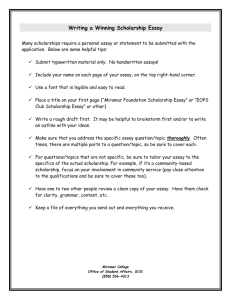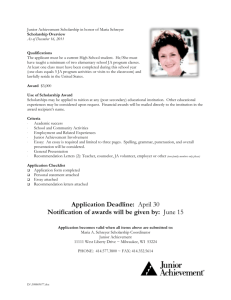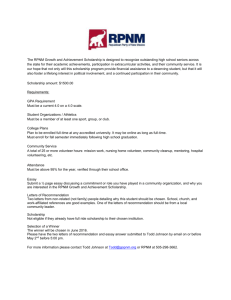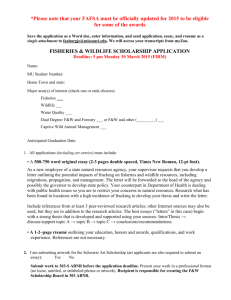Crafting a Winning Scholarship Personal Statement
advertisement
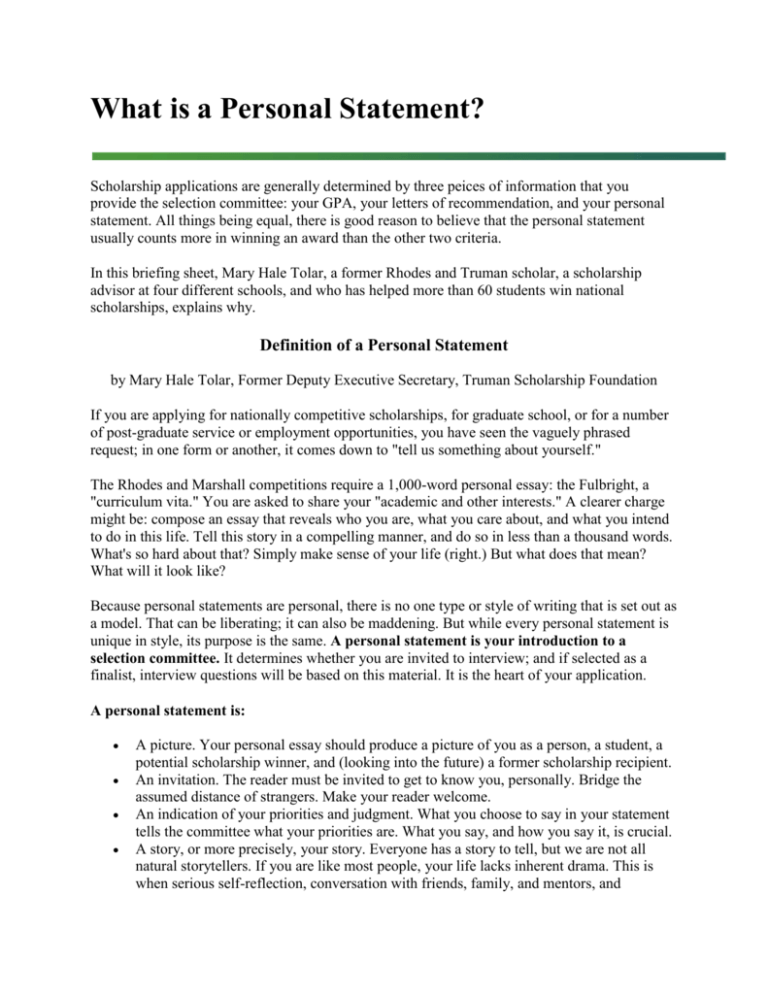
What is a Personal Statement?
Scholarship applications are generally determined by three peices of information that you
provide the selection committee: your GPA, your letters of recommendation, and your personal
statement. All things being equal, there is good reason to believe that the personal statement
usually counts more in winning an award than the other two criteria.
In this briefing sheet, Mary Hale Tolar, a former Rhodes and Truman scholar, a scholarship
advisor at four different schools, and who has helped more than 60 students win national
scholarships, explains why.
Definition of a Personal Statement
by Mary Hale Tolar, Former Deputy Executive Secretary, Truman Scholarship Foundation
If you are applying for nationally competitive scholarships, for graduate school, or for a number
of post-graduate service or employment opportunities, you have seen the vaguely phrased
request; in one form or another, it comes down to "tell us something about yourself."
The Rhodes and Marshall competitions require a 1,000-word personal essay: the Fulbright, a
"curriculum vita." You are asked to share your "academic and other interests." A clearer charge
might be: compose an essay that reveals who you are, what you care about, and what you intend
to do in this life. Tell this story in a compelling manner, and do so in less than a thousand words.
What's so hard about that? Simply make sense of your life (right.) But what does that mean?
What will it look like?
Because personal statements are personal, there is no one type or style of writing that is set out as
a model. That can be liberating; it can also be maddening. But while every personal statement is
unique in style, its purpose is the same. A personal statement is your introduction to a
selection committee. It determines whether you are invited to interview; and if selected as a
finalist, interview questions will be based on this material. It is the heart of your application.
A personal statement is:
A picture. Your personal essay should produce a picture of you as a person, a student, a
potential scholarship winner, and (looking into the future) a former scholarship recipient.
An invitation. The reader must be invited to get to know you, personally. Bridge the
assumed distance of strangers. Make your reader welcome.
An indication of your priorities and judgment. What you choose to say in your statement
tells the committee what your priorities are. What you say, and how you say it, is crucial.
A story, or more precisely, your story. Everyone has a story to tell, but we are not all
natural storytellers. If you are like most people, your life lacks inherent drama. This is
when serious self-reflection, conversation with friends, family, and mentors, and
permission to be creative come in handy.
A personal statement is not:
An academic paper with you as the subject. The papers you write for class are typically
designed to interpret data, reflect research, analyze events or readings--all at some
distance. We are taught to eliminate the "I" from our academic writing. In a personal
statement your goal is to close the distance between you and the reader. You must engage
on a different, more personal level than you have been trained to in college. A resume in
narrative form.
An essay that reads like a resume of accomplishments and goals tells the reader nothing
that they could not glean from the rest of the application. It reveals little about the
candidate, and is a wasted opportunity.
A journal entry. While you may well draw on experiences or observations captured in
your personal journal, your essay should not read like a diary. Share what is relevant,
using these experiences to give a helpful context for your story. And include only what
you are comfortable sharing--be prepared to discuss at an interview what you include.
A plea or justification for the scholarship. This is not an invitation to "make your case."
Defending an assertion that you are more deserving of the scholarship than other
candidates is a wasted effort-you've likely just accomplished the opposite.
Most importantly, a personal statement is authentic. Don't make the mistake of trying to
guess what the committee is looking for, and don't write what you think they want to
hear. They want to know you.
So, what must you include in the personal statement?
An effective personal statement will answer the following questions:
Who am I?
Who do I want to be?
What kind of contribution do I want to make, and how?
Why does it make sense for me to study at Oxford (or York, LSE, Cambridge, Sussex)?
For the Rhodes, you will want to include a proposal of study, one or two paragraphs
devoted to why Oxford makes sense for you. (For the Marshall and Fulbright, your
"proposed academic programme" is presented separately.)
Why is this the right place and program? Is it consistent with your studies and activities
to date? Draw connections.
Remember the goal: grab the readers' interest, and make them want to meet you for an
interview. Get a sense of the experiences and dreams you wish to share, then examine them for a
helpful means of making sense of it all. You will find your story; and if you share it honestly,
you will have written a personal statement.
Finally, know that writing a personal essay is hard and will take many drafts and much
reflection. Don't wait until you have it right to share it with others; their input will likely make it
stronger, clearer, and tighter. Don't put it off until you have it right . . . just write!
ORIGINAL DRAFT: Application for Franke College of Business Scholarships
After I earn my bachelors in marketing at FCB I plan to earn my MBA in Strategic Marketing
and Services Leadership at ASU. Post-graduation, I plan to obtain an entry level management
trainee position in marketing. Eventually I’d like to be a marketing manager or a market
researcher. I’d also like to share my knowledge as a professor to help guide future students by
providing them with the essential tools to be able to compete in a real business environment that
I myself am still preparing to face.
At the very core of my goals and objectives is my desire to be the best possible version of myself
in terms of health, fitness, knowledge, and character. I have a strong desire to add value
wherever I go.
It is my responsibility to fund 50% of my education. Even with working 25 hours a week, I am
facing the possibility of not being able to finance my senior year. This scholarship opportunity is
an essential factor for the advancement of my education, and for the determination of my future
career.
In terms of volunteering, I have assisted the River Bank Clean-up at the Tonto National Forest, a
carwash fundraiser for the Eloy Food Bank, and currently for the Flagstaff Family Food Center.
FINAL DRAFT:
After earning a bachelor’s in marketing at the FCB, I plan to earn an MBA in Strategic Marketing and
Services Leadership at ASU. Post-graduation, I plan to obtain an entry-level management trainee
position in marketing. Eventually, I would like to be a marketing manager or a market researcher in the
nutritional supplement industry. I am fascinated by consumer behavior, business statistics, forecasting,
and supply chain management.
My goals and objectives are centered on my desire to be the best possible version of myself in terms of
health, fitness, knowledge, and character. This translates to pursuing ways to help my community. I
have volunteered at the River Bank Clean-up at the Tonto National Forest, a car wash fundraiser for
the Eloy Food Bank, and have currently been doing prep work for the Flagstaff Family Food Center.
Also, I enjoy tutoring classmates and have hosted group sessions for up to six students.
It is my responsibility to fund 32% of my education. While working over 20 hours a week, I have been
able to maintain an excellent GPA. This scholarship opportunity is an essential factor for the
advancement of my education and for the determination of my future career.
SCHOLARSHIP ESSAY REQUIREMENTS
MARSHALL SCHOLARSHIP
1. Personal Statement -- This should be a short statement (NOT MORE THAN 1000 WORDS).
Candidates should describe his/her academic and other interests and pursuits.
2. Proposed Academic Program (500 words)
Candidates should describe below their proposed academic program, giving reasons for their choice of course
and preferred university. Those hoping to read for a research degree should give an outline proposal of the
research they wish to undertake. If any postgraduate study has already been undertaken, state briefly the
field, and list any theses or dissertations written or published.
3. Choosing the UK (500 words)
Candidates should describe their reasons for wishing to live and study in the UK and how they think this will
benefit them in the future. The candidate should also think about how they will demonstrate their
commitment to the UK through volunteer and extracurricular activities. Candidates should also demonstrate
how they will meet the Marshall Scholarships' objective of gaining an understanding and appreciation of
contemporary Britain. In addition they should demonstrate how they intend to fulfill the Marshall Scholarships'
objective of becoming ambassadors/representatives for the USA in the UK and vice versa thus strengthening
British American understanding.
RHODES SCHOLARSHIP
Applicants should give careful thought to the preparation of a 1000-WORD essay in which they set forth in
their own words their interests and aspirations, and their detailed reasons for wishing to study the specific
areas of proposed academic work at Oxford. This statement is especially helpful to Committees in their
attempt to gain an understanding of an applicant’s strengths, and will be used by the authorities in Oxford to
determine the Rhodes Scholar-elect’s suitability for placement in an academic program and a college at
Oxford.
The Rhodes application calls for the essay to be “written in as simple and direct a manner as possible.”
Excellent Rhodes personal statements are infused with concrete examples, a self-reflective tone, a showcasing
of priorities and service, and an overall picture of yourself as a person of accomplishment and character. Some
applicants make the mistake of seeing the essay as an academic mini-thesis or a narrative resume, while others
treat it as an exercise in purple prose. Meanwhile, remember the bottom line about the goal of the personal
statement in the eyes of the readers: describing your specific area of proposed study and reasons for wishing
to study at Oxford.
FAQ: The personal essay seems very important. Can you give me any advice?
The essay is very important, and one should approach it conscientiously. Until the interview (if you
are selected for one), it is an important way—along with the letters of referees and the
endorsement letter of your institution—to get a sense of who you are, how you think, how you
write, and what you aspire to. Committees realize that it cannot be guaranteed that an essay is
not reviewed or critiqued by anyone else—although that is our desire and is the reason we ask
that it be certified as one’s own work. Usually, however, it is evident to committees when an
essay has effectively been written by one’s advisor(s), or by committee, or when it has been so
heavily edited that it is no longer the applicant’s voice. Such essays are not useful.
TRUMAN SCHOLARSHIP
7. Describe one specific example of your leadership. Limit 2000 characters including spaces.
8. Describe a recent particularly satisfying public service activity (do not repeat experience described in 7).
Limit 1700 characters including spaces
9. Describe the problem or needs of society you want to address when you enter public service. (If possible,
use statistical data to define the magnitude of the problem.) Limit 1500 characters including spaces
12. Describe the graduate education program you intend to pursue if you receive a Truman Scholarship. Limit
2000 characters including spaces
13. What do you hope to do and what position do you hope to have upon completing your graduate studies?
Limit 900 characters including spaces
14. What do you hope to do and what position do you hope to have five to seven years later? Limit 900
characters including spaces
15. What additional personal information do you wish to share with the Truman Scholarship Foundation? Limit
2000 characters including spaces
Policy Proposal: Problem Statement, Proposed Solution, Major Obstacles/Implementation Challenges
GOLDWATER SCHOLARSHIP
ESSAY: Typed and confined to two pages ,one side only. {This is roughly 1000 words.} Font size may not be
smaller than 12 characters per inch or 11 point.
Your essay should discuss a significant issue or problem in your field of study that is of particular interest to
you. Your essay must include a description of the issue or problem, discuss an idea for research that could have
significant impact on the issue or problem, describe an aspect of the research in which you would be involved,
and explain the relevance of the issue or problem to you as a mathematician, scientist, or engineer. The
content and style of your essay will be important to the success of your scholarship application.
Assume that your reader is knowledgeable in mathematics, science, and engineering, and will have the
expertise to read, review, and understand the complexities of your field of specialty. If your essay involves
research in which you are or were involved, please indicate if you are or were the sole researcher or if you
collaborated with another individual. Include a bibliography, references, or illustrations, when appropriate, as
part of the essay, which will be included in your two pages.
3. What are your professional aspirations? Indicate which areas of mathematics, science, or engineering you
are considering making your career and specify how your current academic program and your overall
educational plans will assist you in achieving this goal.
4. Describe an activity or experience that has been important in clarifying or strengthening your motivation for
a career in science, mathematics, or engineering.
5. Goldwater Scholars will be representative of the diverse economic, ethnic, and occupational backgrounds of
families in the U.S. Describe any characteristics or other personal information about yourself or your family
that you wish to share with the selection committee. (very short)
UDALL SCHOLARSHIP
ESSAY: In 800 words or less, discuss a significant public speech, legislative act, book, or public policy statement
by Congressman Morris K. Udall or Secretary of Interior Stewart L. Udall and its impact on your field of study,
interests, and career goals.
2. What are your professional aspirations? What issues, needs or problems do you hope to address? Indicate
in which area(s) of the environment, or tribal public policy, or Native American health care you are considering
making your career and specify how your academic program and your overall educational plans will assist you
in achieving your goals. (Limit 2000 characters with spaces)
4. Describe non-course-related research experience, if applicable. Indicate which areas of the environment, or
tribal public policy, or Native American health care your research affects, and the ways in which the experience
will assist you in achieving your goals. (Limit 1500 characters with spaces)
5. Describe a leadership experience in which you made a difference on campus or in your community. (Limit
2400 characters with spaces)
6. Describe a specific activity or experience that has been important in clarifying or strengthening your
commitment to the environment, or tribal public policy, or Native American health care. (Limit 1000 characters
with spaces)
7. Describe briefly your most significant public service, community, or campus activities associated with your
interests in the environment, or tribal public policy, or Native American health care, in which you regularly
participate. (Limit 2200 characters with spaces)
8. What additional information (not already addressed in the application) do you wish to share with the Udall
Scholarship review committee? (Limit 1100 characters with spaces)

